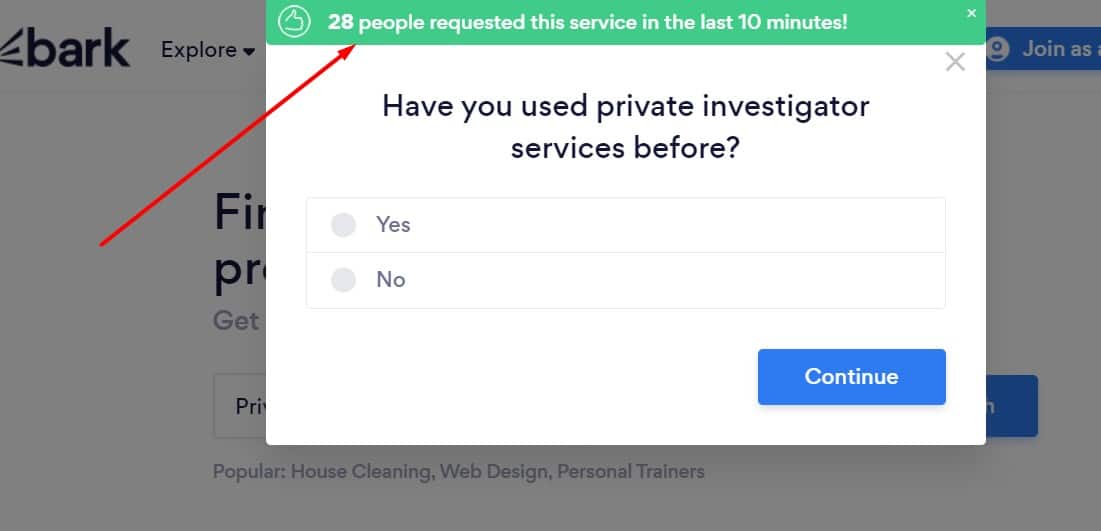
Private Investigator Near Me
Get a Private Investigator Near You
#1 Local Private Investigator Directory
Step 1: Click Below & Choose Your State
Step 2: Tell Us What Type of Private Investigator You Need
Choose your state above & get connected with a local private investigator.
If you are searching for a "private investigator near me" then this guide will help you find the best services in your area, it will describe how to chose the proper investigator for your needs, and describe some of the most frequently asked questions to get the most from your private investigator services.
Finding a Private investigator near me has become very easy with a new service called Bark.
Bark is the world's largest marketplace for professional services and allows you to find private investigators near you.
Bark will help you find the right private investigator, whether it's a one-time task or an ongoing relationship. With over 18 million professionals in over 100 countries, its easy to find a private investigator near me.
You can search by location, industry, or service type to find the perfect match for your project. Once you've found someone you like, you can send them a message to get started.

What Type of Private Investigator Near Me Should I Hire?
When you need to hire a private investigator, there are a few things to keep in mind. First, you'll want to decide what type of investigator you need.
There are three main types of investigators: corporate, criminal, and civil. Each type has its own strengths and weaknesses, so you'll need to decide which one is right for your case.
Corporate investigators are usually hired by businesses to investigate employees or other businesses. They're typically very good at finding out information about people, and they have access to resources that can help them do their job well. However, corporate investigators can be expensive, and they may not be able to help you if your case is particularly sensitive.
Criminal investigators are usually hired by the police or by prosecutors. They're typically very good at investigating crimes, and they have access to resources that can help them do their job well. However, criminal investigators can be expensive, and they may not be able to help you if your case is particularly sensitive.
Civil investigators are usually hired by individuals or businesses to investigate other individuals or businesses. They're typically very good at finding out information about people, and they have access to resources that can help them do their job well. However, civil investigators can be expensive, and they may not be able to help you if your case is particularly sensitive.
Civil investigators would be used if you suspect your spouse is cheating. While they can be very expensive, you can find other ways to catch a cheater, that are much less expensive. Try our Reverse Phone search and search their number for detailed online information.

Private investigators also engage in the following activities:
How Will a Private Investigator Catch a Cheating Partner?

A cheating partner can be difficult to catch, but there are a few methods that private investigators use to help uncover infidelity. One common method is surveillance, which involves tracking the suspected cheater's movements and activities. This can be done through GPS tracking, following them physically, or even monitoring their social media and phone activity.
Another method is to conduct interviews with the suspect's friends, family, and colleagues to see if there are any suspicious behaviors or patterns that emerge. Finally, private investigators may also use Polygraph tests, or lie detector tests, to get to the bottom of a cheating partner's behavior.
Before deciding to hire a private investigator near you, you really should try some alternative such as our email lookup, and reverse phone lookup. You never know what you may uncover!
What Do I Need to Decide Before Hiring a Private Investigator?
Before looking for the best match, you first need to clarify exactly what information you want them to gather, and whether a PI is the best way to go acquire that information.
PIs are often requested to dive into very personal matters so decide beforehand whether this is the kind of information you are comfortable with the PI knowing.
These are the important questions to ask yourself before finding a PI.
1. What Information Are You Comfortable Sharing?
The more specific the information we give the PI, the more leads he or she has to work with. This means you might need to share some embarrasing information.
A PI needs clarification on the entire issue and which factors and actors are involved. This paints the clearest picture of the situation so that they know where to start, what to look for and what does not fit the picture.

2. What Kind of Information Am I Looking For?
Don’t send the PI out on a wild goose chase. Not only could this prove to be very costly but it is also less likely to bring us the information that we actually want.
Think about what the purpose is of the investigation and what type of information is necessary to meet that purpose. For example, a concerned spouse might only want proof of a cheating spouse without wanting additional information on the person their spouse is cheating with. Another example is law enforcement only wanting information that they can submit as evidence in a court case.
3. Am I Ready to Accept Undesirable Outcomes and Sensitive Information?
We consult a PI because we don’t know the full story but we should also be asking ourselves if we really want the full story. This is especially important when hiring a PI for personal matters.
For example, investigators are often asked to locate a relative, someone that the client has not been in contact with for a long time. The question that the client needs to ask themselves is whether they are truly ready to get back into contact with that relative. Perhaps there was a long lasting feud that is unlikely to get resolved or emotional scars that would reopen when meeting them again.
The information that we receive is not always the desired outcome and we should prepare ourselves for that possibility.
4. Is Hiring a Private Investigator Near Me the Best Option?
Private investigators are not the only option for obtaining information. Depending on the situation, there may be other reasonable options.
For personal matters, talking to the people involved can already bring up a lot of information. It might also feel more comfortable than having to bring a stranger into the fold.
Businesses and law firms may hire PI to perform background checks but sometimes simply asking the client or employee directly can already lead to the necessary answers. Getting a PI involved may also break the trust between the company and the person being investigated.
In other words, people do not always appreciate having a PI investigate them. It can create distrust between the parties which can be harmful to the rest of the relationship, whether it is a personal or working relationship.
What Are the Steps to
Hire a Private Investigator Near Me?

Here are 14 recommended steps to hire a private investigator. Remember that trust plays a very important role in this arrangement so make sure that you verify everything and watch out for the red flags.
Step 1: Use Bark to Find Local Services
Bark has the largest database of professional services, and you can find an investigator using this link.
Step 2: Communicate Your Issue With the Professional
Bark will provide you a list of professional investigators, and you can message them directly to intiate your first meeting whether online or in person.
Step 3: Filter for Specialties
It is common for private investigators to specialize in a specific type of case. For example, some may have more experience with personal matters, others with due diligence or perhaps the private detective is mostly active on criminal cases.
Make the final choice easier to get to by filtering out the type of private investigators that are specialized in an unrelated field. This should still leave you with plenty of choice because most PI firms have several fields of expertise. This can be done using the free Bark service.
Step 4: Filter for Specialties
Chances are that there is more than one suitable candidate for the job. Make a shortlist of the most promising private investigator and then verify the qualifications of this shortlist.
The best way to verify the shortlist is by calling in to the local private investigation association. If it is concerning a court case you might also want to call up law firms or police departments that work with them.
Step 5: Call and Ask for References
PIs should be easy to reach so call their office and ask for references. A trustworthy PI would not refuse this request.
Step 6: Confirm Their License and Qualifications
Depending on the location, the PI may not be legally obliged to have a license. However,professional and trustworthy investigators do have an official license to practice. Also, ask about their training and where they have received their certification.
It is okay to ask them for a copy of their license and qualification.
Step 7: Check Their Insurance
All professional PIs should have insurance that covers them for any injuries they may suffer on the job. However, this insurance is just as important for the client as it is for the PI themselves. The insurance ensures that the client is not liable for anything that might happen to the PI while investigating their case.
Step 8: Ask Where Their Office Is
As mentioned, a respectable personal investigator has their own office. This shows that they are running a serious business and that they are unlikely to disappear.
Step 9: Prepare for the Meeting
Prepare as much information and evidence as possible. This brings the PI up to date faster which also means they can start the investigation faster. This cuts down on some of the hours they would have otherwise spent on preliminary research.
Bringing in all the information that is already available also generates leads for the PI. It gives them a better idea of where to start and which are the most important elements at play.
Step 10: Meet in Their Office
Although it is not mandatory to meet in their office, it is recommended. This is another opportunity for the client to seize up the character and quality of the PI. This is also where they are most likely to keep their certifications and licenses.
Step 11: Ask About the Process
It is okay to ask the investigator how they would go about gathering the information. This is also another factor that helps you answer whether you still want to continue with the investigation.
Asking about the process is also important to understand what the billed hours are spent on and how much it would approximately cost.
This is also the point where you could sniff out non-traditional practices. For example, if the PI suggests wiretapping you would know that they are not professional and do not conduct their investigations through legal measures.
Step 12: Discuss the Fees
A professional PI has standard rates and should be able to provide them to you in a clear manner. However, there may be different fees for different kinds of investigation.
Don’t forget to ask about any additional costs besides the hourly rate. The PI might charge for certain equipment and any travel expenses that may be necessary. Remember that a PI might be for flexible in the pricing if it is concerning a long and extensive job.
As for payment, most PIs work with a retainer. For fixed price jobs they might ask for 50% up front and the other half after the information has been delivered.
Step 13: Set Up a Follow Up Meeting
Decide whether you would like to continue with the investigation and whether they were the best PI for the job. If you decide that they are then set up a follow up meeting to discuss the details of the case - this is where the PI will start to go in-depth into the case.
Step 14: Be Patient
It is fine to check for updates every once in a while but don’t get antsy. Gathering quality information takes time so give the PI enough time to work. They will contact you for any necessary updates.
Where Else Can I Find a Private Investigator Near Me?
Once you have clearly defined what kind of information you need, you can start searching for a suitable private investigator. This requires trust between the client and the PI so make sure that you find an agency or individual that you feel comfortable with and has the credentials to perform the job.
Online Search Engines
There are several specified online search engines to find private investigators near me. Below are a few examples websites where you can find a PI.
www.pinow.com (worldwide)
www.martinpi.com (California)
https://www.thumbtack.com/k/private-investigators/near-me/ (worldwide)
https://www.haywoodhunt.ca/how-private-investigators-can-find-people-for-you/ (Canada)
Alternatively, type private investigators near me into your Google or Safari search engine. The GPS settings on the search engine should help you find the nearest PI office.
References
Instead of an online search, asking for referrals from friends and acquaintances is also a smart idea. This has the added benefit of knowing someone that has already worked with the PI before. They can tell you about the regular rates and how well the PI performs.
Referral from Official Institutions
Individuals are not the only clients of private investigators. They are also often hired by law enforcement and attorneys. Since these are official institutions, it is worthwhile to get a reference from them.
The following offices or institutions may have a list of recommended PIs:
Certain states may also have their own official PI Association. These associations are not mandatory so they won’t have a registry of all PI’s in the state but their members are strong candidates for the job.
How Much Does a Private Investigator Near Me Cost?

The average cost to hire a private investigator varies greatly. It will depend on the location, the type of investigation and likely their experience level.
Most private investigators near me charge an hourly fee which can range anywhere between $40 - $200. There might be some flexibility in the hourly rate when the job is more extensive and requires a lot of hours.
Besides the hourly fee there are usually also additional costs such as their transportation costs and overnight stays if applicable. They might also charge for the use of specific equipment.
Certain investigation jobs might have a flat fee because the PI already knows how many hours it will approximately take to find the desired information. The most common tasks such as locating a person or surveillance on a spouse often have a flat fee.
Many PIs also require a retainer. A retainer is a specific amount of money that is to be paid upfront, similar to a deposit. Once the investigation is completed, the PI will return what is left of the retainer, if any of the funds remain. Costs that exceed the retainer must still be paid by the client.
What Qualifications Should a Private Investigator Near Me Have?
As mentioned, being a private investigator is a legal and monitored profession. This means that every professional PI must have a set of official credentials.
These are the elements you need to look out for when deciding whether a PI is trustworthy.
1. They are Licensed
Official PIs must have a license. If they do not have a license then they are not registered and/or have not passed the official private investigator test.
Scroll down to the section Private Investigator Licenses Around the World for more details on how to verify the PI is licensed.
2. They Have an Office
An office means that they have a full fledged business. It is added security for the client because it makes it unlikely that the the PI will disappear before delivering results.
3. They Have a Clean Record
People can file complaints on a PI to the official private investigators association, even if they are not a member. You can also verify the PI has a clean record by checking public police records.
4. Strong Background
Ask the PI about their background. A PI with a background in law enforcement will be more trustworthy because they are aware of the legal boundaries and they are often also better equipped because of their years of experience in law enforcement and investigation.
5. Is Clear on the Fees
A professional knows what their services are worth and how much an investigation will cost approximately. A PI should always provide their clients with clear information on what their services costs, how it will be calculated, what is or is not included and how the payment must be made. Dodgy billings and misinformation are a red flag that it might be a scam.
6. They Offer Referrals
Don’t be afraid to ask for referrals from their past cases. A true professional will provide them without hesitation. It is a sign that they have nothing to hide and deliver satisfactory work.
7. Good Attitude
A lot can be said about a person’s character simply from meeting them and having a conversation. A trustworthy PI is professional at all times, gives clear answers and remains polite during the entire process. If something does not sit well after meeting them, move on to other potential hires.
Private Investigator Licenses Around the World
Private investigator licensing is different everywhere in the world. In some countries such as the United States and Canada different states will release their own state or provincial license. This means that the qualifications and requirements might also differ per location.
World Association
Although they do not offer licensing, there is a worldwide association for the profession called the World Association of Detectives or W.A.D, for short. It is a joint effort by the International Secret Service Association and the World Association of Detectives.
The goal of W.A.D. is to establish and maintain ethical behaviour within the profession and to remove those that are unprofessional. It also nurtures closer and respectful relationships between different agencies from around the world.
United States
You can find the specific requirements for obtaining a private investigator license per state on this website. You will find that certain states are stricter than others. For example, some require several years of experience in law enforcement while others only require the person to have passed a state exam.
There are three states that do not require a PI licensing at state level nor local level. These states are Idaho, Mississippi and South Dakota. Instead of a government released license, these states have a Private Investigators Association that have their own guidelines on safe and ethical practices.
There are two states that do not have PI licensing at state level but they are released at local level. These US states are Wyoming and Alaska.
Canada
In Canada, a PI license is given by the province and each province has their own regulations. Because of the difference per province, a PI license obtained in one province is not valid in another province. To be legally allowed to perform their duties in a different province, the investigator must ask for special privileges of the governing body in that particular province.
United Kingdom
Although a PI license is not a requirement to practice in the UK, there is a national governing body that releases certified private investigator licenses. This institute is called the Security Industry Authority or SIA, for short.
To acquire a PI license from SIA one must have passed several exams, be older than 18 years old and have the right to work in the United Kingdom.
Australia
In most Australian states having a state license is mandatory to be a practicing private investigator. The only exception is the Australian Capitals Territory. In all other states the person must first acquire a certificate in Investigative Services.
Most states offer online courses to obtain the certificate which means that the study is self-paced. The only Australian state where this is not possible is Victoria where private investigators are required to have 40 contact hours in a class room, as well.
New Zealand
The Private Security Personnel Licensing Authority (PSPLA) is the government body regulating the profession in New Zealand. In order to apply for a certificate the person must show evidence of experience and proper training.
There are several qualifications that the PSPLA would consider as evidence of competency. This could be several years of experience as an apprentice for a private security of PI agency, membership of the New Zealand Institute of Professional Investigators (NZIPI) or New Zealand Security Association. There are also certifications such as the New Zealand National Diploma in Security Level 6 or Professional Certified Investigator ASIS Certification.
In short, there are several ways to become a licensed PI in New Zealand, through both experience and study.
Countries Where Private Investigations are Illegal
There are a few countries where private investigator is not a legal profession and so hiring a PI or working as a PI is illegal. Examples of these countries are Saudi Arabia and China. Persons involved with private investigation in these countries are subject to criminal persecution.
Copyright © TruthScouts.com. All Rights Reserved
